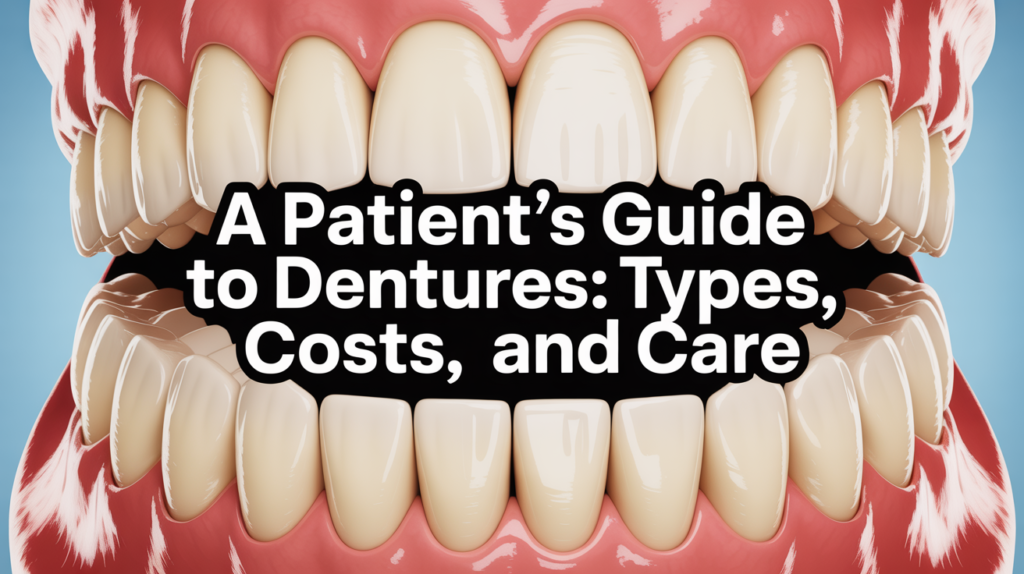A Patient’s Guide to Dentures: Types, Costs, and Care
Losing teeth can feel overwhelming, but dentures are a reliable solution that restores both function and confidence. Whether you’ve lost teeth due to decay, injury, or aging, understanding the different types of dentures, their costs, and how to care for them is essential. This guide aims to answer your most pressing questions and provide practical advice to help you navigate the world of dentures with ease 😊.
Many patients hesitate to pursue dentures because they’re unsure what to expect. From the initial fitting to daily maintenance, this article will walk you through everything you need to know. By the end, you’ll have a clear understanding of how dentures work, what they cost, and how to keep them in great shape for years to come. Let’s dive in!
What Are Dentures?
Dentures are removable appliances designed to replace missing teeth and surrounding tissues. They play a vital role in restoring oral health by enabling proper chewing, clear speech, and a natural-looking smile. Modern dentures are crafted to be comfortable and functional, ensuring patients can enjoy life without worrying about gaps in their teeth. Whether full or partial, dentures are customized to fit each patient’s unique needs.
Tooth loss can occur for many reasons, including gum disease, cavities, trauma, or aging. Without replacement, missing teeth can lead to jawbone deterioration, shifting of remaining teeth, and even changes in facial structure. Dentures address these issues by filling in the gaps and supporting your mouth’s structure. Now that you know what dentures are, let’s explore the different types available.
Main Types of Dentures
Full Dentures
Full dentures are used when all the teeth in the upper or lower jaw are missing. They’re typically made from acrylic and feature a flesh-colored base that fits snugly over the gums. Full dentures are ideal for patients who have lost most or all of their natural teeth and need a complete replacement solution. Moving on, let’s look at partial dentures for those who still have some healthy teeth remaining.
“Dentures come in various types such as complete full dentures, partial removable dentures, and implant-supported dentures, with costs ranging from $1,000 to $20,000 depending on the type, materials used, and complexity of construction.”-greatbocasmiles.com
Partial Dentures
Partial dentures are designed for individuals who still have some natural teeth. These appliances use metal or plastic frameworks to hold artificial teeth in place while attaching to existing teeth with clasps. Partial dentures not only fill gaps but also prevent remaining teeth from shifting out of alignment. Next, we’ll discuss implant-supported dentures, which offer additional stability.
Implant-Supported Dentures
Implant-supported dentures combine the benefits of traditional dentures with dental implants for added security. These dentures snap onto titanium posts surgically implanted into the jawbone, providing superior stability and comfort. Ideal candidates include those with sufficient bone density and a desire for a long-term solution. Finally, immediate and temporary dentures offer a quick fix during healing periods.
Immediate and Temporary Dentures
Immediate dentures are placed right after tooth extraction, allowing patients to avoid going without teeth during the healing process. While convenient, they often require adjustments as the gums shrink and heal. Typically, these dentures serve as a temporary solution until permanent ones are ready. Understanding these options helps set realistic expectations for treatment.
How Much Do Dentures Cost?
The cost of dentures varies widely depending on the type and materials used. On average, low-cost dentures start around $452, while premium models can exceed $6,514. Full dentures generally cost more than partials due to the complexity of fabrication. Implant-supported dentures tend to be the priciest option, reflecting the surgical procedure and advanced materials involved.
“Materials significantly influence denture costs and longevity, with options like acrylic resin being less expensive but requiring more frequent replacement, whereas porcelain and metal partials offer greater durability at higher costs.”-greatbocasmiles.com
Several factors influence pricing, including the dentist’s expertise, geographic location, and the quality of materials. For instance, porcelain teeth may cost more than acrylic but offer better durability. Additionally, preparatory procedures like extractions or bone grafts can add to the overall expense. Understanding these variables helps patients budget effectively.
While denture costs might seem high, investing in quality ensures better comfort and longevity. Cheaper options may save money upfront but could lead to frequent repairs or replacements down the line. Keep this in mind as we move into discussing financial assistance options that can make dentures more affordable.
Dental Insurance and Financial Assistance
Most dental insurance plans cover at least part of the cost of dentures, though coverage varies. Some plans pay for a percentage of the total, while others cap benefits at a specific dollar amount. It’s important to review your policy carefully to understand what’s included. Patients should also inquire about any waiting periods or exclusions related to denture treatments.
“The national average cost for dentures in the U.S. can range from $452 for low-cost dentures up to $6,514 for premium dentures according to CareCredit’s 2024 Cost Study.”-CareCredit
For those without insurance, there are alternative ways to access affordable care. Dental schools often provide discounted services performed by supervised students. Medicaid and VA benefits may also assist eligible individuals. Exploring these options ensures that financial barriers don’t stand in the way of getting the care you need.
The Denture Fitting and Adjustment Process
Getting fitted for dentures involves several steps to ensure a precise match. Your dentist will take detailed measurements and impressions of your mouth to create a mold. This mold serves as the blueprint for crafting custom dentures tailored to your unique anatomy. Once fabricated, the dentures are tested for fit and adjusted as needed.
Follow-up visits are crucial for fine-tuning the fit and addressing any discomfort. Even well-made dentures may require minor tweaks as your mouth adjusts. Regular check-ins with your dentist ensure optimal performance and reduce the risk of complications. With the fitting process covered, let’s talk about adapting to life with new dentures.
Living with New Dentures: Common Challenges and Tips
Adjusting to new dentures can take time, and it’s normal to experience challenges like sore spots or difficulty speaking. To minimize irritation, try using a denture adhesive during the initial phase. Practice reading aloud or repeating phrases to regain fluency in speech. Patience and persistence are key to overcoming these hurdles.
Eating with dentures may feel awkward at first, especially with hard or sticky foods. Start with soft foods cut into small pieces and gradually reintroduce tougher items. Chewing evenly on both sides of your mouth helps distribute pressure and prevents slipping. Remember, these adjustments get easier with practice!
How to Care for Your Dentures
Daily Cleaning
Cleaning your dentures daily is essential for maintaining hygiene and preventing stains. Rinse them under running water to remove food particles, then gently brush with a soft-bristled brush and non-abrasive cleaner. Avoid regular toothpaste, as it can scratch the surface. Proper cleaning keeps your dentures looking fresh and extends their lifespan.
“You can expect to pay anywhere from $500 – $1,000 for a basic denture. $30,000 to $50,000 for full-mouth, implant-supported fixtures.”-DentaVacation
Proper Storage
Storing dentures correctly overnight is just as important as cleaning them. Always soak them in a denture-cleaning solution or plain water to keep them moist and prevent warping. Never leave them exposed to air, as dryness can damage the material. A consistent storage routine ensures your dentures stay in top condition.
Avoiding Common Mistakes
Mistakes like using hot water to clean dentures or dropping them can lead to costly repairs. Hot water can warp the acrylic base, while accidental drops may crack or chip the appliance. Handle dentures carefully over a towel or sink filled with water to cushion potential falls. Avoiding these pitfalls protects your investment.
When to Replace or Repair Dentures
Over time, dentures may show signs of wear or become loose due to changes in your mouth’s structure. Persistent discomfort, cracks, or poor fit indicate the need for repair or replacement. Addressing these issues promptly prevents further damage and ensures continued comfort. Regular dental visits help catch problems early.
If your dentures break, don’t attempt DIY fixes-consult your dentist for professional repair. Depending on the extent of the damage, repairs might involve relining, rebasing, or creating a new set altogether. Staying proactive about maintenance guarantees the best results.
Alternatives to Traditional Dentures
While dentures remain a popular choice, alternatives like dental bridges and implants offer fixed solutions. Bridges rely on neighboring teeth for support, while implants anchor directly into the jawbone. Though more expensive, these options provide unmatched stability and longevity. Consider discussing these possibilities with your dentist to determine the best fit for your needs.
Tips for a Successful Transition to Dentures
Transitioning to dentures requires patience and self-care. Be kind to yourself as you adapt, and seek support from friends, family, or online communities. If feelings of frustration arise, remind yourself that adjustment takes time. Regular communication with your dentist ensures a smoother journey toward regaining confidence and functionality.
Frequently Asked Questions (FAQ)
How long do dentures typically last?
With proper care, dentures can last between 5 to 10 years. However, changes in your mouth’s shape may necessitate earlier replacement. Routine maintenance and dental checkups help prolong their lifespan.
“Proper care and maintenance, regular dental check-ups, and understanding insurance coverage and payment options are critical for managing the long-term investment of dentures.”-greatbocasmiles.com
Will dentures change how I speak or eat?
Initially, dentures may affect your speech and eating habits, but most people adapt within a few weeks. Practicing regularly speeds up the learning curve and restores normalcy.
What if my dentures feel uncomfortable or loose?
If discomfort persists despite adjustments, consult your dentist immediately. Loose dentures can cause irritation and impact oral health, so timely intervention is critical.
Can I sleep with my dentures in?
It’s generally recommended to remove dentures at night to give your gums a rest and maintain oral hygiene. Sleeping in them occasionally won’t harm, but consistency matters.
Are there foods I should avoid with new dentures?
Avoid hard, chewy, or sticky foods initially, as they can dislodge dentures. Opt for softer options and cut food into manageable pieces to ease the transition.
Conclusion
Understanding the types, costs, and care routines associated with dentures empowers patients to make informed decisions. Whether you opt for full, partial, or implant-supported dentures, proper maintenance and regular dental visits ensure lasting comfort and functionality. By staying proactive, you can enjoy the benefits of a confident smile and improved oral health 🌟.
Remember, your journey with dentures doesn’t stop here. Regular checkups and open communication with your dentist pave the way for success. Take charge of your oral health today!
If you’re considering dentures or have questions about your current set, reach out to your dental provider for personalized guidance. Don’t wait-take the first step toward a healthier, happier smile!



